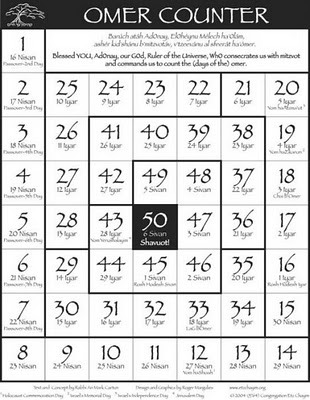
You shall count for yourselves -- from the day after the Shabbat, from the day when you bring the Omer of the waving -- seven Shabbats, they shall be complete. Until the day after the seventh sabbath you shall count, fifty days... -Leviticus 23:15-16
You shall count for yourselves seven weeks, from when the sickle is first put to the standing crop shall you begin counting seven weeks. Then you will observe the Festival of Shavu'ot for the L-RD, your G-d -Deuteronomy 16:9-10
According to the Torah (Lev. 23:15), we are obligated to count the days from Passover to Shavu'ot. This period is known as the Counting of the Omer. An omer is a unit of measure. On the second day of Passover, in the days of the Temple, an omer of barley was cut down and brought to the Temple as an offering. This grain offering was referred to as the Omer.
Every night, from the second night of Passover to the night before Shavu'ot, we recite a blessing and state the count of the omer in both weeks and days. So on the 16th day, you would say "Today is sixteen days, which is two weeks and two days of the Omer."
The counting is intended to remind us of the link between Passover, which commemorates the Exodus, and Shavu'ot, which commemorates the giving of the Torah. It reminds us that the redemption from slavery was not complete until we received the Torah.
This period is a time of partial mourning, during which weddings, parties, and dinners with dancing are not conducted, in memory of a plague during the lifetime of Rabbi Akiba. Haircuts during this time are also forbidden. The 33rd day of the Omer (the eighteenth of Iyar) is a minor holiday commemorating a break in the plague. The holiday is known as Lag b'Omer. The mourning practices of the omer period are lifted on that date. The word "Lag" is not really a word; it is the number 33 in Hebrew, as if you were to call the Fourth of July "Iv July" (IV being 4 in Roman numerals). See Hebrew Alphabet for more information about using letters as numbers.
There was at one time a dispute as to when the counting should begin. The Pharisees believed that G-d gave Moses an oral Torah along with the written Torah, and according to that oral Torah the word "Shabbat" in Lev. 23:15 referred to the first day of Passover, which is a "Shabbat" in the sense that no work is permitted on the day (Rosh Hashanah and Yom Kippur are both referred to as "Shabbat" in this sense, though they cannot both occur on a Saturday in the same year; see Lev. 23:24 and 23:32; see also Lev. 23:39 the first and eighth days of Sukkot are called "Shabbat"). In this view, held by most Jews today, the counting begins on the second night of Passover, that is, the day after the non-working day of Passover. The Tzedukim (Sadducees) rejected the idea of an oral Torah and believed that the word "Shabbat" in Lev. 23:15 referred to the Shabbat of the week when Pesach began, so counting would always begin on a Saturday night during Passover. The Sadducees no longer exist; today, only a small sect call the Karaites follow this view.
Shavuot - Feast of Pentecost - Begins @ Sundown
Let us receive the Torah upon Our Hearts this Fiftieth Day. May the Cloven Tongues of Holy Ghost Fire, Ruach ha-Kodesh, burn Brightly on this Mountain, which We Now Know is Our Mind this day. Let us walk in humility, Yea! with great power from Yeshua within. Let us go forth conquering with Yahovah’s Perfect Love my friends!
